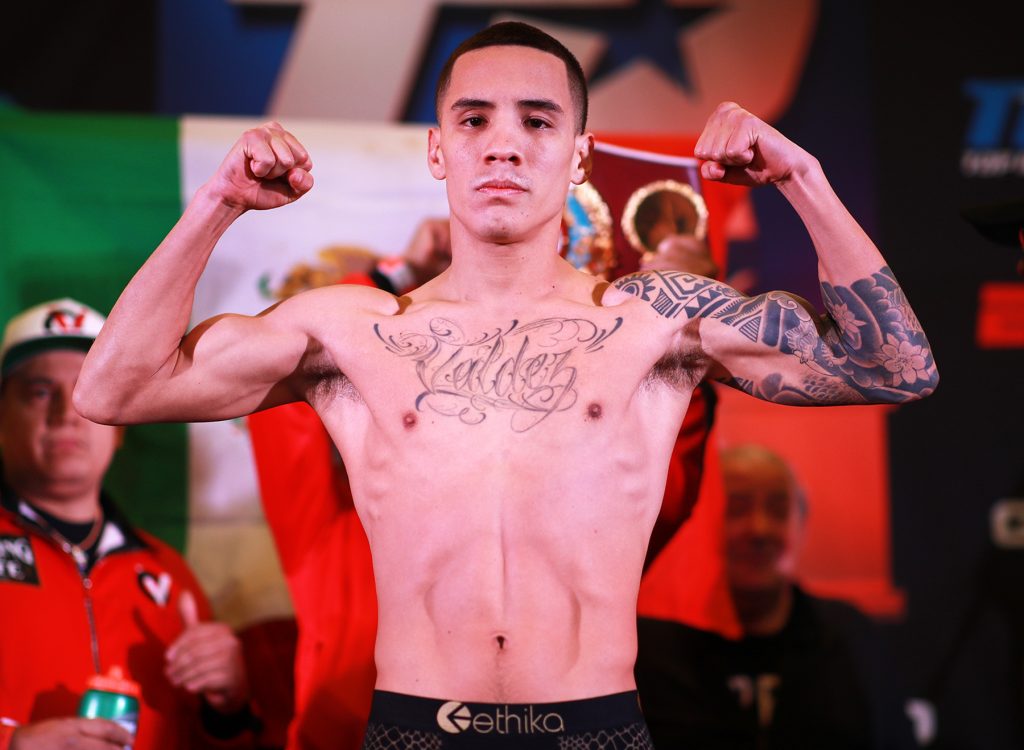Oscar, Eddy and the power of powerful questions

By Bart Barry-
Saturday in Las Vegas undefeated Mexican Oscar Valdez dropped Mexican titlist Miguel “El Alacran” Berchelt, The Ring’s number one super featherweight, thrice and stopped him violently in round 10. Carcrash violently. It was a much-anticipated match, broadcast by ESPN and promoted by Top Rank, that saw the underdog win in what was, but for a few rounds in its middle, a rout.
This was the sort of definitive ending to a definitive fight you wish on anyone who signs up for prizefighting and so few attain. Nothing polemical, nothing squishy, nothing for unperspectivèd pundits to unpack. A fully realized lefthook that dangled the larger man and champion in a space between his ongoing lightness and a perpetual darkness.
Valdez reacted dramatically, crying-out and making running circles. Nowhere to put all that emotion. A complete loosening of a man who appeared so tight for so long. There was a cultural element to it all, too, that solely a Mexican would understand about another Mexican.
You could feel elation for Valdez even as you felt dread then sympathy for Berchelt even as you felt relief, perhaps, for our beloved sport. When it gets it right and definitive, there’s nothing like boxing, is there?
There was a moment in the match a quarterhour before Valdez’s lefthook that felt unique. Immediately after round 6, one that saw Berchelt in the middle of his best four-minute run of the fight, Valdez walked to his corner and had the following exchange with his chief second, Eddy Reynoso:
ER: ¿Cómo te sientes?
OV: Bien.
ER: ¿Cómo lo sientes a él?
OV: Cansado.
(ER: How do you feel?
OV: Good.
ER: How does he feel to you?
OV: Tired.)
It struck me immediately it was the first time I recalled hearing a trainer give so much trust to his charge’s judgment during a prizefight. Lore and tradition tell us the trainer is a father figure, often saintly, and the fighter is an impetuous child, often ungrateful. Part of the reason folks went in for and still do go in for the Cus D’Amato mythos, aside from Mike Tyson’s untiring salesmanship, is because tradition so well prepared us for the relationship D’Amato told everyone he had with Tyson and Tyson now tells everyone he had with D’Amato.
If that’s too American, here’s a Mexican version: Nacho Beristáin and the Brothers Marquez. Before Rafael’s third match with Israel Vazquez, Nacho memorably opined, “If Rafael obeys (me), he will win.” You can count on your fist the number of times Nacho or Coach Freddy asked Juan Manuel or Manny how the other guy was feeling during their 126 minutes of combat.
I ask you how you’re doing then I tell you how your opponent is doing – that’s the gist of the trainer-fighter dialogue, if the trainer doesn’t begin by telling the fighter, too, how he is feeling. If, as Oscar Wilde wrote, all bad poetry is sincere, so too is all bad corner advice.
Eddy Reynoso is a new generation of trainer. He has guided, generally gently, our sport’s alpha predator, Canelo Alvarez, to an unlikely state of constant improvement. Canelo has taught Reynoso how to run a corner.
Surely Reynoso saw with the rest of us Berchelt’s gathering strength in round 6, even if Reynoso probably didn’t expect Berchelt to be emergent as he was in round 7. Yet before Reynoso began strategizing and stuffing 10 minutes of instructions in 50 or so seconds, he gathered intelligence from Valdez. A little of that may’ve been curiosity, Reynoso’s wishing to confirm his own intuition. More of that, though, was proper coaching.
Reynoso wanted Valdez to hear himself confirm his own intuition. Do believe had Valdez’s replies been disordered – I feel tired, and he feels strong – Reynoso would have altered his advice accordingly. That is the mark of a great coach. Reynoso was wholly present, in the moment with his charge, not lost in a thicket of his own pastround observations. That’s why Reynoso was able to ask a question that began with the word how.
As generations of legal dramas have taught us, yes-no questions are only about confirming already held assumptions: “You feel fine, right? And he’s tired, isn’t he?” Questions of that sort are useless to a coach. The opposite point on the spectrum – questions that begin with what and allow the speaker to learn about himself – would not have been appropriate in the middle of a confrontation like Saturday’s, either, though they’d be damn potent in a training camp.
We hear so often about a fighter’s need to trust his trainer. Here is a new direction, call it Sendero Reynoso, by which a trainer learns to trust his fighter.
Valdez’s assessment of Berchelt at Saturday’s midway point mightn’t have been flawless – there’s plenty of machismo in any Mexican prizefighter (machismo for which Reynoso has an automated filter, of course) – but Valdez’s hearing himself say Berchelt was tired absolutely helped Valdez make it through round 7 and begin to change the fight back in round 8. Which is not to imply Valdez lacked confidence at any moment Saturday.
Confident or not, though, there was a little Margarito-Cotto 1 energy (I know you felt it too) when Berchelt started taking runs at Valdez in rounds 6, 7 and 8. There was nothing inevitable in round 7, then, about Valdez’s vindication in round 10.
An ending like what Valdez put on Berchelt and every expert who doubted him (I wasn’t asked to offer a prediction but am confident I’d’ve been wrong as everyone else) is what we seek in sport. Something so decisive, so final, you’ve no choice but to shut-up and nod. ¡Felicidades, Oscar!
Bart Barry can be reached via Twitter @bartbarry